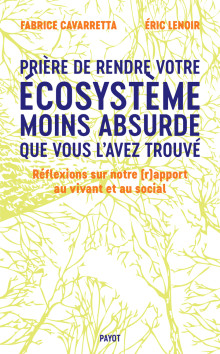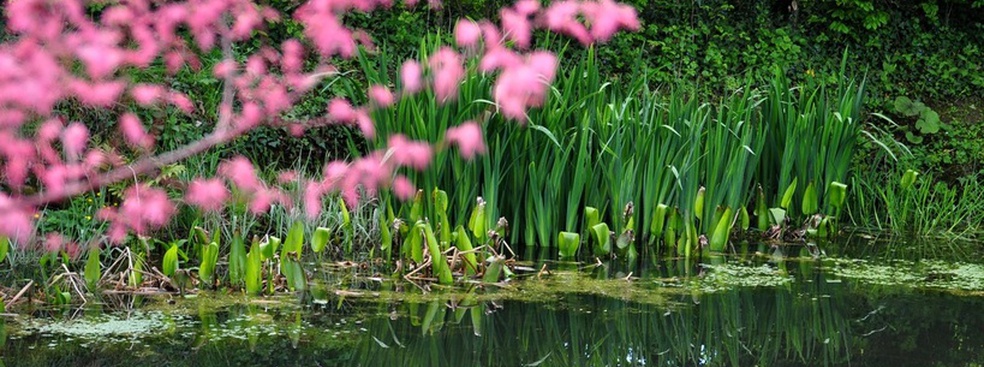A social science researcher and an environmental activist meet—what will they discuss? It turns out the answer includes sharing thoughts on how humans treat their surroundings, based on the experience of Éric Lenoir, punk landscaper and biodiversity advocate, and Fabrice Cavarretta, associate professor of management at ESSEC Business School. At first glance, their paths seem to have little in common: Éric, hands in the soil, advocating for environmental treatment that respects living beings; Fabrice, eyes fixed on organizations, a researcher in management theories. Yet their conversations revealed a troubling convergence: they shared the same concerns about actors’ worldview, whether in the natural or social sphere.
Their recent book, Prière de laisser votre écosystème moins absurde que vous l'avez trouvé: Réflexions sur notre (r)apport au vivant et au social (Please leave our ecosystem less absurd than you found it: Reflections on our relationship to living beings and society), was born out of these reflections. With this work, they aim to help those who manage human organizations — politicians, managers, nonprofit activists — with a view on how to motivate them to do good and to train them to do so.
Revisiting our managerial worldviews
Have you ever reflected that we have evolved little in a century on how to support human organizations? We remain largely prisoners of a Taylorian logic that assumes a clear intention exists (idea, vision, objective), relies on some substantive elements (geopolitics, market, needs), proceeds through methodical planning, and relies on economic calculations to optimize results.
To account for the complexity of the current world, this method needs to evolve. The work of Edgar Morin and the Sante Fe Institute reminds us that systems—whether environmental or organizational—largely escape our linear control logics. In these systems, interactions between elements create unpredictable emergent properties, making the Taylorian relationship with the world fragile.
The garden metaphor, as used in our book, allows us to evoke various principles that distinguish themselves from classical management.
Supporting human organizations like marvelous gardens
Imagine a novice gardener facing their first plot of land. Their natural reflex? To control everything: pull up what sticks out, align the rows, standardize the plantings. However, the experienced gardener knows that a healthy ecosystem relies on diversity, complex interactions, and a certain dose of unpredictability.
The same goes for human organizations. The book develops several principles of this "managerial ecology":
Inhabit before managing. Before transforming an ecosystem, one must first observe it, understand it, and settle into it. How many managers arrive in an organization with ready-made solutions, without taking time to grasp the existing dynamics? The gardener, on the other hand, first studies their soil, exposure to the elements, and climate.
Cherish diversity. In nature as in organizations, homogeneity is attractive but dangerous. A diversified ecosystem better resists shocks, adapts more easily to changes. Despite this clear benefit, our organizations tend toward standardization, uniformization of profiles and practices.
Tinker at the margins. The gardener doesn't completely redo their garden each season. They adjust, test, adapt with small touches. They conduct experiments on numerous small zones before considering gradually scaling up. Margins and experimentation are the pillars of healthy development of a flourishing ecosystem.
Count on evolution. Living systems evolve permanently. Resisting this evolution is futile; accompanying it with intelligence becomes an art. This implies accepting that our initial plans are constantly questioned by field reality.
Stating such principles does not constitute a miracle method, but rather suggests developing a different posture toward organizational complexity. They invite replacing the illusion of total control with a form of situational and complex intelligence.
Management and administration schools face numerous challenges. They aspire—following ESSEC's example—to participate in renewing how we train those who will manage organizations. It's likely that future models will rely on principles drawn from our book, such as:
Patient observation before action, systematic valorization of organizational diversity, acceptance of uncertainty as a normal component, experimentation through small touches before scaling up, cultivation of creative margins, benevolent accompaniment of permanent system evolution, attention to interactions rather than isolated elements, recognition of natural organizational cycles, development of situational and complex intelligence, and progressive construction of ecosystemic trust.
Toward a managerial ecology
These principles, explored in our book through the analogy between the environment and society, offer a concrete alternative to classical approaches to politics, management, and activism. We must call for such evolutions. Let us hope that such principles will one day constitute the backbone of humanistic and complex training of those managing humans in organizations. Rather than risk that future leaders fundamentally retain only ideation, planning, control and resource consumption, let us develop the delicate art of organizational gardening.
Because ultimately, as the title of our book declares, it's about "making your ecosystem less absurd than you found it." A modest, pragmatic, and terribly ambitious objective all at once.
Cover photo courtesy of Eric Lenoir
Reference
"Prière de rendre votre écosystème moins absurde que vous l'avez trouvé" Cavarretta & Lenoir (Payot 2024, see details at: http://www.cavarretta.fr/rvs)










